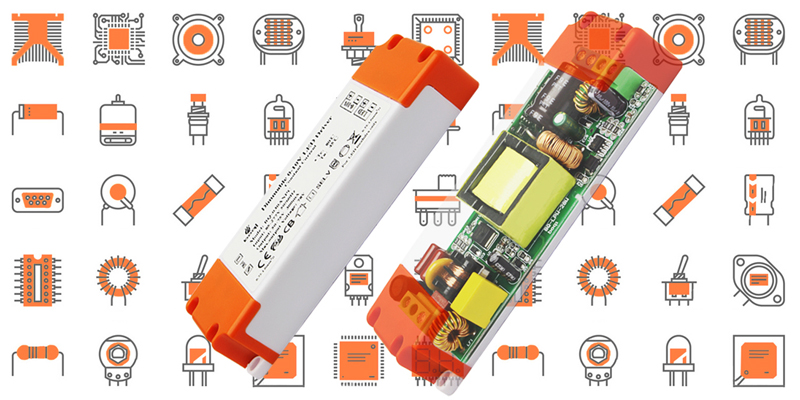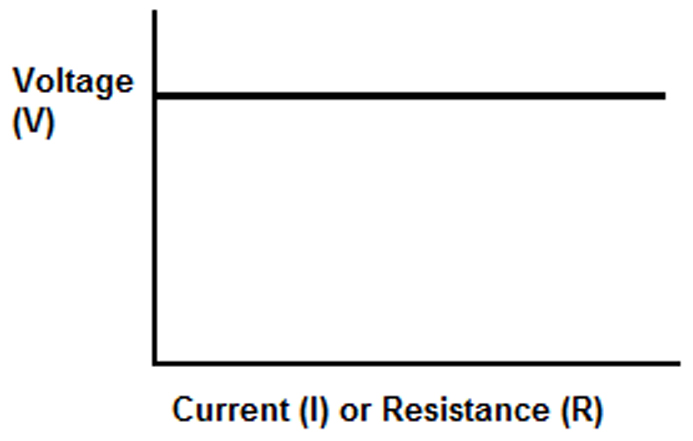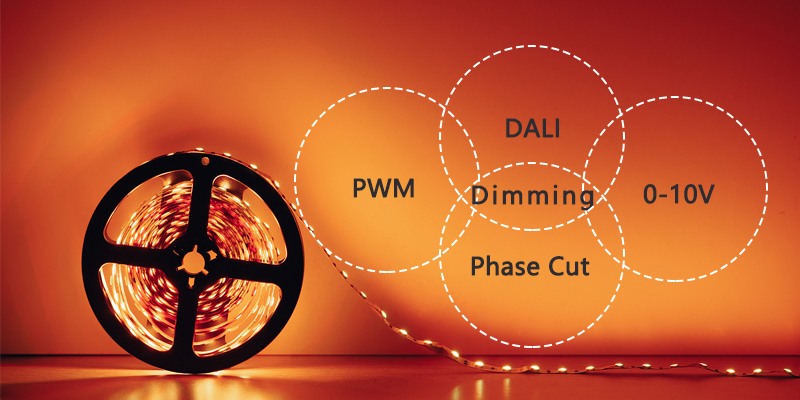
Navigare tra le complessità di Driver LED La selezione è un argomento di notevole importanza nel campo dell'elettronica e dell'illuminazione. A uno sguardo superficiale, il processo potrebbe sembrare semplice. Tuttavia, individuare un driver adatto che si allinei perfettamente con un prodotto illuminotecnico ottimizzato richiede un'attenzione meticolosa.
In realtà, la procedura comprende più fasi. È indispensabile esaminare meticolosamente ogni fase delineata, soprattutto se l'obiettivo è identificare un driver che risponda ai requisiti di forma d'onda della tensione e di controllo della fase di un sofisticato sistema di lampade a LED.
1. Determinazione della domanda
In primo luogo, è indispensabile stabilire se si tratta di un driver per esterni o per interni. Sebbene il termine "driver per esterni" possa far pensare a un'esclusività per gli ambienti esterni, di solito si riferisce a un grado di impermeabilità IP66 o superiore, abbinato a un grado di protezione contro le sovratensioni di 2kV in modalità differenziale e 4kV in modalità comune. I driver per esterni trovano posto soprattutto nei fari a baia e nell'illuminazione antideflagrante. Al contrario, i driver per interni, se dotati di una robusta protezione contro le sovratensioni, possono essere adattati all'uso esterno. Tuttavia, i termini "per esterni" e "per interni" rimangono i termini prevalenti per le applicazioni di illuminazione.

2. Modalità a corrente o tensione costante
Nel campo dell'elettronica e dell'illuminazione, la scelta tra le modalità a corrente costante (CC) e a tensione costante (CV) per i driver LED è fondamentale. La modalità CC garantisce una corrente costante, fondamentale per i LED per mantenere una luminosità uniforme e una lunga durata. Al contrario, la modalità CV, ideale per le configurazioni con più LED o strisce in parallelo, fornisce una tensione di uscita impostata. Ciascun LED o striscia in questi progetti trae la corrente necessaria da questa sorgente di tensione, ma è essenziale che ognuno abbia il proprio meccanismo di limitazione della corrente. La scelta tra CC e CV dipende dalle esigenze del sistema di illuminazione: CC si concentra sulla precisione per i singoli LED, mentre CV enfatizza la flessibilità per le configurazioni più ampie. La comprensione di queste modalità è fondamentale per ottenere prestazioni ottimali del sistema LED.



3. Selezione della potenza nominale:
Per le lampade a LED, la potenza nominale si riferisce invariabilmente alla potenza di ingresso. Tuttavia, quando si parla di driver LED, si fa riferimento alla potenza di uscita, che è il prodotto della corrente di uscita e della tensione massima di uscita. La chiave è assicurarsi che la potenza scelta superi la potenza di picco del carico del LED.
4. Specifiche della tensione di uscita
La scelta della giusta tensione di uscita per un driver LED è fondamentale per garantire prestazioni e durata ottimali dei sistemi di illuminazione a LED. Il driver per LED funge da alimentatore per il LED, convertendo l'alimentazione in ingresso nella tensione, nella corrente e nella frequenza corrette richieste dal LED. Quando si sceglie un driver per LED, bisogna assicurarsi che la sua tensione di uscita corrisponda ai requisiti di tensione del LED o del gruppo di LED che dovrà alimentare. Tensioni non corrispondenti possono portare a una riduzione della luminosità, a variazioni di colore, a sfarfallii o addirittura a un guasto prematuro del LED. Inoltre, è essenziale considerare l'ambiente operativo, poiché i requisiti di tensione possono cambiare in base alle fluttuazioni di temperatura. Alcuni driver per LED avanzati sono dotati di impostazioni di tensione di uscita regolabili, che offrono flessibilità per varie applicazioni. In conclusione, selezionando con cura la giusta tensione di uscita per un driver LED, si può garantire un uso efficiente dell'energia, una qualità costante della luce e una maggiore durata del sistema LED.
5. Specifiche della corrente di uscita
Questa fase è fondamentale e dipende in larga misura dal tipo di chip LED scelto e dal suo punto di funzionamento ottimale. Spesso la corrente desiderata non è facilmente reperibile negli elenchi dei modelli di driver. In questi casi, si presentano due strade: selezionare il modello più vicino disponibile o contattare il produttore del driver per ottenere un modello specifico. La prima offre immediatezza, ma potrebbe compromettere le prestazioni della luce, mentre la seconda, sebbene potenzialmente lunga, garantisce un prodotto finale ottimale. La scelta dipende sempre dalla strategia di mercato del produttore e dalle circostanze specifiche.
Se non siete ancora sicuri delle specifiche del driver LED di cui avete bisogno, provate a utilizzare il nostro sito web Calcolatrice del driver LED!

6. Decisione sul tipo di cavo
Per il mercato nordamericano, i cavi UL, prevalentemente con guaine in PVC, sono la norma. Al contrario, in altre regioni del mondo si tende a preferire i cavi VDE con guaine in gomma. Vale la pena notare che i cavi UL sono accettati a livello globale, ma sono soggetti a restrizioni come driver indipendenti secondo gli standard CE. Gli standard IEC introducono il dispositivo di classe II, privo di collegamento a terra. Quando si integrano i connettori, è fondamentale essere consapevoli delle loro certificazioni. I connettori certificati UL possono essere costosi, il che spinge alcuni a optare per le scatole di giunzione per le connessioni, soprattutto in Nord America.
7. Selezione della certificazione
Le certificazioni sono fondamentali. Per il mercato dell'UE, la CE è un prerequisito, mentre la UL è fondamentale altrove. La ENEC è spesso considerata superiore in molte regioni. La certificazione CB è importante per la sua facile conversione in KC, PSE o SAA a fronte di un costo nominale. In Nord America, la classificazione di classe 2 può semplificare la progettazione delle luci, analogamente a SELV in altri territori globali.
8. Scelta del metodo di regolazione della luminosità
Questa fase può essere complessa per gli ingegneri illuminotecnici, dato che le loro competenze sono spesso più orientate alla meccanica dell'illuminazione che all'elettronica e al controllo. È fondamentale accertare la necessità di una funzione di dimmerazione e la sua realizzazione, che sia tramite TRIAC / Taglio di fase, 0-10V, DALIo PWM. La scelta di protocollo di controlloCiascuno di questi protocolli, con i suoi vantaggi e limiti, dipende dal fatto che si tratti di un progetto nuovo o di un retrofit. Un approfondimento su questi protocolli sarà affrontato in un articolo successivo.

9. Verifica dei campioni
Una volta conclusa la progettazione elettrica, il viaggio non è finito. Il passo successivo è l'acquisizione e la validazione di campioni del sistema di illuminazione. È consigliabile ordinare i campioni in lotti, inizialmente di 2-3 unità, per valutare la consistenza del prodotto. Dopo aver superato con successo i test sulle prestazioni elettriche, è possibile ordinare un lotto più grande per una prova pilota. La dimensione consigliata per un singolo lotto supera le 50 unità. Inoltre, la comprensione delle tempistiche di consegna dei prodotti, soprattutto per gli ordini di grandi quantità, è fondamentale per entrambe le parti per garantire una produzione senza interruzioni.
10. Valutazione della qualità e del servizio
Prima di prendere una decisione definitiva, è indispensabile esaminare la garanzia, valutare la qualità del servizio clienti e la capacità del fornitore di comprendere le esigenze del cliente. Questi fattori giocano un ruolo fondamentale durante e dopo la transazione.
boqi LED Driver si attiene meticolosamente alle fasi sopra descritte, impegnandosi a collaborare con voi in ogni momento. Il nostro obiettivo è cogliere le vostre esigenze in modo completo e presentare la soluzione più adatta. Ci auguriamo di instaurare un rapporto duraturo. Per ulteriori prodotti di qualità, consultate le nostre offerte.

Per chi preferisce un'esperienza di apprendimento visiva, è disponibile anche un'esercitazione video.







